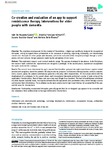Co-creation and evaluation of an app to support reminiscence therapy interventions for older people with dementia

Ver/
Use este enlace para citar
http://hdl.handle.net/2183/41198
A non ser que se indique outra cousa, a licenza do ítem descríbese como Creative Commons Attribution-NonCommercial-NoDerivatives 4.0 International License (CC-BY-NC-ND 4.0)
Coleccións
- Investigación (FCS) [1295]
Metadatos
Mostrar o rexistro completo do ítemTítulo
Co-creation and evaluation of an app to support reminiscence therapy interventions for older people with dementiaAutor(es)
Data
2024-10-03Cita bibliográfica
De-Rosende-Celeiro I, Francisco-Gilmartín V, Bautista-Blasco S, Ávila-Álvarez A. Co-creation and evaluation of an app to support reminiscence therapy interventions for older people with dementia. Digit Health. 2024 Oct 3;10:20552076241261849.
Resumo
[Abstract]
Objective: The objectives encompassed (1) the creation of Recuerdame, a digital app specifically designed for occupational therapists, aiming to support these professionals in the processes of planning, organizing, developing, and documenting reminiscence therapies for older people with dementia, and (2) the evaluation of the designed prototype through a participatory and user-centered design approach, exploring the perceptions of end-users.
Methods: This exploratory research used a mixed-methods design. The app was developed in two phases. In the first phase, the research team identified the requirements and designed a prototype. In the second phase, experienced occupational therapists evaluated the prototype.
Results: The research team determined the app's required functionalities, grouped into eight major themes: register related persons and caregivers; record the patient's life story memories; prepare a reminiscence therapy session; conduct a session; end a session; assess the patient; automatically generate a life story; other requirements. The first phase ended with the development of a prototype. In the second phase, eight occupational therapists performed a series of tasks using all the application's functionalities. Most of these tasks were very easy (Single Ease Question). The level of usability was considered excellent (System Usability Scale). Participants believed that the app would save practitioners time, enrich therapy sessions and improve their effectiveness. The qualitative results were summarized in two broad themes: (a) acceptability of the app; and (b) areas for improvement.
Conclusions: Participating occupational therapists generally agreed that the co-designed app appears to be a versatile tool that empowers these professionals to manage reminiscence interventions.
Palabras chave
Information and communication technology
Ageing
Dementia
Occupational therapy
Professional practice
Reminiscence
Technology development
Ageing
Dementia
Occupational therapy
Professional practice
Reminiscence
Technology development
Versión do editor
Dereitos
Creative Commons Attribution-NonCommercial-NoDerivatives 4.0 International License (CC-BY-NC-ND 4.0)
ISSN
2055-2076






